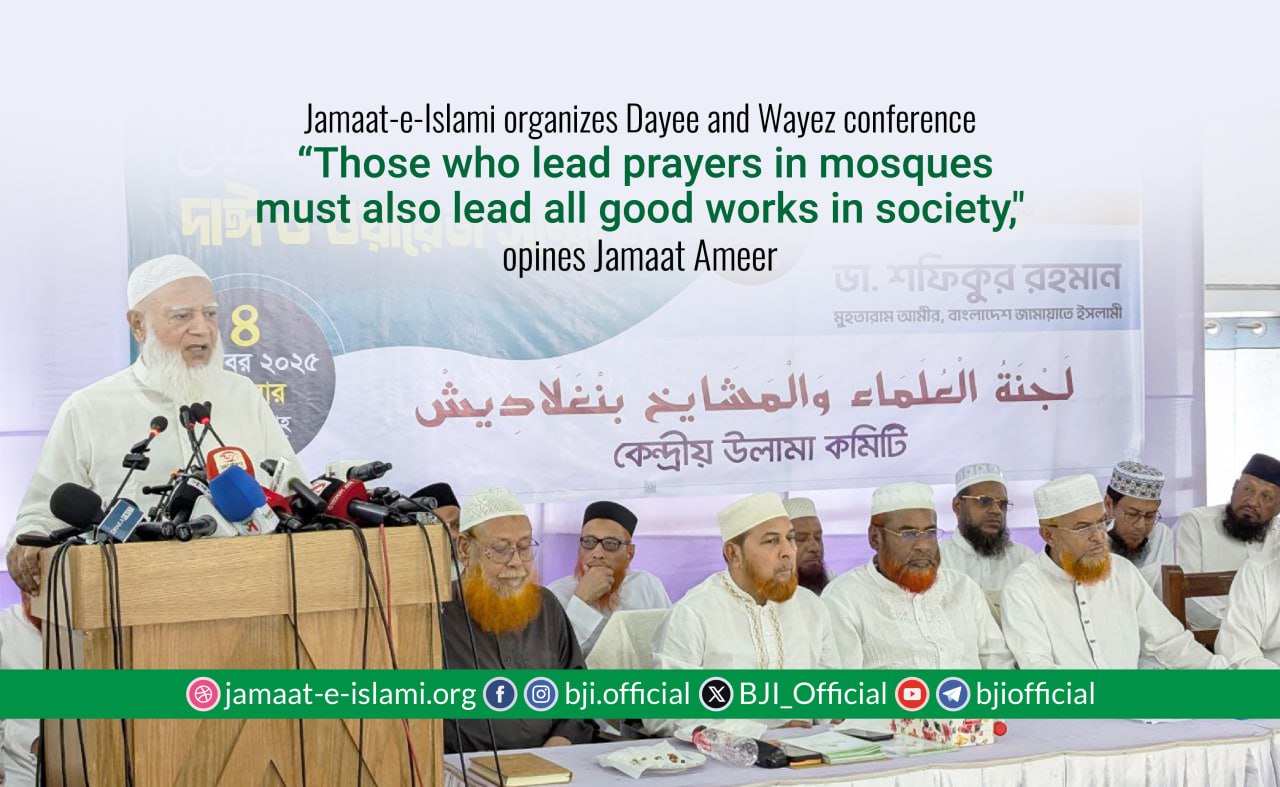Bangladesh Jamaat-e-Islami's Ameer , Dr. Shafiqur Rahman said that those who lead prayers in mosques, must also take leadership in all good works within their communities. When the scholars and religious leaders (Ulama) of the country assume the leadership of the nation, only then, the nation, society, and state will progress toward welfare, and an ideal welfare-oriented state and society will be established, Insha’Allah.
He further said that according to the national census, 90.08 percent of Bangladesh’s population is Muslim. But Bangladesh is a country of communal harmony, where people of different faiths have lived side by side in peace and mutual understanding for centuries. “We do not support dividing the nation based on religion,” he added.
Referring to the importance of unity among Islamic parties and forces, the Jamaat Ameer said that such unity is the desire of the people of the country. He urged the prominent wayez and dayee(Islamic Preachers) present at the conference to avoid any statements that may cause division or misunderstanding within the ranks of Islamic groups.
He made these remarks while addressing as the chief guest at a conference of distinguished Islamic Preachers and scholars, held today, Saturday, October 4, at 11 a.m. at the Al-Falah Auditorium in Moghbazar.
The conference was presided over by Jamaat-e-Islami's Assistant Secretary General and president of central Ulama committee Maulana Abdul Halim. Special guests included Jamaat-e-Islami's Secretary General and former MP Professor Mia Golam Porwar, and Assistant Secretary General Maulana Rafiqul Islam Khan.
Among others, former Principal of Ta’mirul Millat Kamil Madrasa Maulana Zainul Abedin, Chairman of the Trustee Board of Bangladesh Islamic University and former Principal of Jamia-e-Qasemia, Narsingdi Maulana Syed Kamal Uddin Jafri, and former Principal of Gopalganj Alia Madrasa and President of Bangladesh Majlisul Mufassireen
Maulana Abdul Hamid spoke on the occasion.
The event was hosted by Jamaat-e-Islami's Central Working Committee Member and Secretary of the party’s Central Ulama Committee Dr. Maulana Khalilur Rahman Madani.
Distinguished wayez and dayees (Islamic Preachers) from all over the country attended the conference.
Dr. Shafiqur Rahman further said, “You, the dayee ilallah (those who invite toward Allah), must be humble. Allah loves humble people, and people too love the humble. Under no circumstances should you engage in arguments or self-destructive debates. We all must remember that we are responsible individuals. Inviting people toward the path of Allah is our collective duty. We will have to answer to Allah for this responsibility, and we must always remain conscious of this accountability.”
He continued, “You have the duty to awaken the nation. For that, everyone must become proficient in modern knowledge and science. Just as our beloved Prophet (peace be upon him) fulfilled his responsibilities, we too must follow his path. We must awaken the conscience of all people—regardless of religion, race, or color.”
He added, “The divine law of Allah—Islam—is a complete code of life. We must present the guidance of the Qur’an to everyone. We must call people to Islam by presenting its eternal principles and, at the same time, serve all people irrespective of religion, race, or community. In the society established by the Messenger of Allah (peace be upon him), everyone enjoyed their rights; no one was deprived of them.
He further said, “We must follow the Messenger (peace be upon him) completely. We must never bow to anyone except Allah. We must strive, with heads held high, to make the religion of Allah victorious.” He called upon the ulama (Islamic scholars) to dedicate themselves to this effort.
Professor Mia Golam Porwar said, “There must be consistency between our words and our actions. If our words and actions do not align, our message will not touch people’s hearts. We must present the true message of Islam to people based on the Qur’an and Sunnah. We must deliver intellectually and analytically grounded da’wah to awaken people’s consciences. He urged the preachers to avoid controversial statements and to correctly present the concepts of Jihad, Islamic Shariah, and the faith of Islam before the public.”
